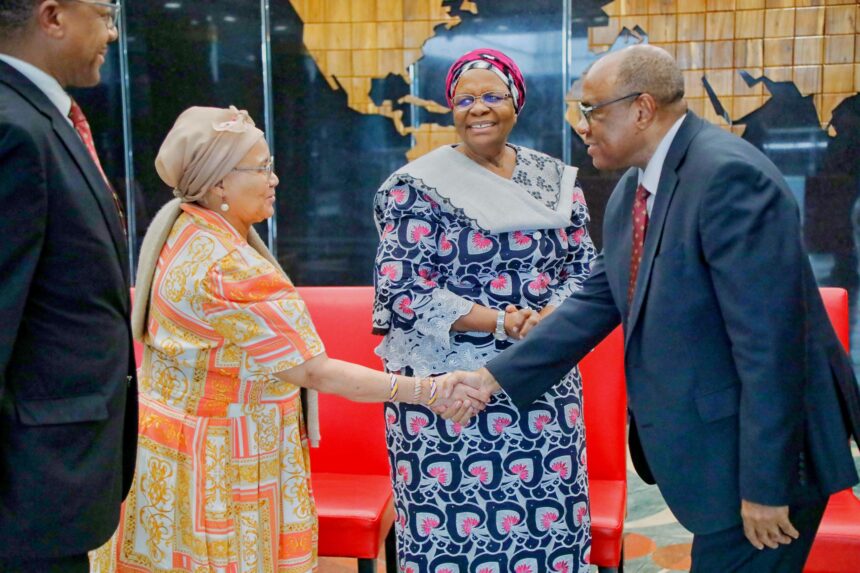The domestic economy maintained a positive growth trajectory during the first quarter of 2025.
This was largely supported by strong performance in the mining sector, particularly uranium, gold and zinc as well as notable gains in construction, wholesale and retail trade, communication and tourism.
Based on these figures, the central bank expects the domestic economy to grow by 3.8% and 4.0% in 2025 and 2026, respectively, from a 3.7% estimated in 2024.
The latest projections for 2025 and 2026 reflect a downward revision of 0.2 and 0.5 percentage points from projections published in the Bank of Namibia’s December 2024 Economic Outlook update.
These reflect heightened uncertainty emanating from global trade policy shifts.
“Inflation accelerated to 4.2% in March 2025, largely driven by increases in food, alcoholic beverages, transport and housing prices… Looking ahead, we have revised our average inflation forecasts for 2025 and 2026 upwards to 4.2 and 4.5%, respectively.
At the same time, our foreign reserves declined by 5.2% quarter-on-quarter to N$59.7 billion, with the import cover currently estimated at 3.9 months or 5.2 months when excluding oil and gas-related imports financed externally,” commented governor of the Bank of Namibia, Johannes !Gawaxab.
He made these remarks last Friday while hosting President Netumbo Nandi-Ndaitwah and high-ranking government officials as part of the central bank’s annual statutory engagement.
During the engagement, the central bank provided an update on the performance of the domestic economy, noting that real gross domestic product (GDP) growth slightly moderated to 3.1% in the fourth quarter of 2024, compared to 3.2% in the preceding quarter.
The governor raised concerns about the broader implications of Donald Trump’s tariffs, noting that while Namibia’s direct exports to the United States remain relatively limited, “the impact on our economy is far from insignificant”.
He said the tariffs risk undermining the competitiveness of Namibian goods and disrupting global value chains, particularly as key trading partners such as China, the European Union and South Africa are also affected.
He added this could potentially reduce Namibia’s export performance, and weaken external demand over time.
!Gawaxab highlighted that the resulting volatility has placed pressure on the Namibia Dollar.
The depreciation is likely to raise the cost of imports, fuel inflationary pressures and widen the current account deficit if left unchecked.
He underscored the importance of proactively pursuing a more diversified export strategy, and deepening engagement in global trade diplomacy to safeguard Namibia’s economic resilience in the face of shifting global dynamics.
Recognising the evolving challenges, the Bank reaffirmed its commitment to evidence-based policymaking.
The Bank shared its ongoing macroeconomic research and policy advisory work in rural economic development, global agricultural value chains, fisheries policy outcomes, water scarcity, and the financial implications of recent oil discoveries that have the potential to advance socio-economic development, job-creation and poverty alleviation once fully implemented.
!Gawaxab was accompanied by deputy governors Leonie Dunn and Ebson Uanguta at the meeting, which served as a platform to provide a comprehensive overview of recent economic developments.
The meeting outlined the bank’s key strategic initiatives supporting economic transformation and inclusive growth.
A key discussion during the engagement highlighted the Bank of Namibia’s decision to commence gold accumulation as part of its foreign exchange reserve management strategy.
The move to include gold, targeting 3% of net foreign exchange reserves, aligns with global central banking trends, given gold’s strategic value in hedging against inflation and enhancing resilience during economic shocks.
The central bank’s leadership updated the presidential delegation on the progress of strategic projects underway in 2025.
This includes Namibia’s Central Securities Depository (CSD) project, where the CSD company has received all necessary licences and is moving forward with industry engagement and phased system implementation.
This milestone is expected to significantly modernise Namibia’s financial markets and attract greater offshore investment.
In addition, through the Instant Payment Programme (IPP), via its dedicated subsidiary, Instant Payments Namibia (IPN), the central bank is developing a fast, secure and low-cost real-time payment platform.
!Gawaxab noted this initiative seeks to enhance financial inclusion, reduce payment processing costs and drive digital transformation.



